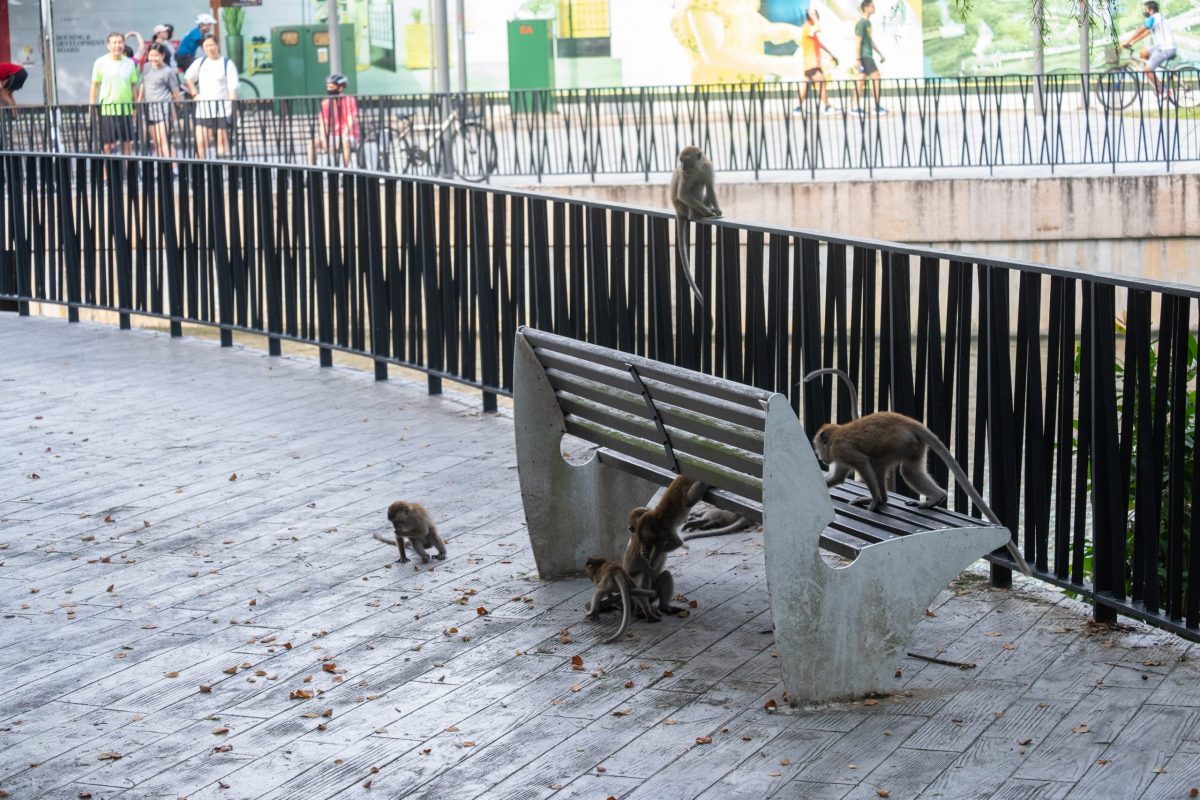
MONKEY BUSINESS: Heartwarming Reunion Of Baby Macaque With Troop
Article Written by Ramaa Rangnekar, JGIS Primates Team
With just a month to go for Lunar New Year, the spirit of reunion and reconnection seems to be in the air in both the human and wildlife world. The weekend of 15th of January saw the reunion of an adorable baby macaque with its troop, made possible by the rescue team at ACRES and some vigilant Singaporeans.
The Reunion As It Happened
The Beginning
Serene was walking her dog around Chestnut Close one evening when they came across a crowd gathered around the fence of what used to be Chestnut Drive Secondary. Upon closer inspection, she saw that what the crowd was gaping at was a frightened baby monkey stranded upon the rusty and barbed school fence.
A man was repeatedly attempting to poke at the baby monkey with his child’s scooter, actions which had driven away from the mama monkey earlier on, leaving the scared baby on her own. The man only stopped harassing the monkey and left when Serene told him off. The baby, for her part, clung on to the fence for dear life as it was quite a high drop and the ground on the other side was cold, hard and could do her serious injury.

Serene and her dog (Photo Credit: Serene)
Next Steps
Serene called ACRES immediately and waited at the park to ensure that there was a minimal crowd and that the baby did not fall due to exhaustion. With the hopes that mama monkey or any of the troop would come back, ACRES waited a while before coming to the case. Serene worked with them closely, reporting back the monkey’s situation to them periodically.
When it was clear that no one was coming back to claim the baby, ACRES arrived.
“We always push for this thing called reunion, or reintroducing it into the family,” says Mr Kalai Vanan S/O Balakrishnan, co-CEO of ACRES about stepping up to reunite the baby with its troop. “We fundamentally believe that no matter what animal, as long as it’s a wild animal, its highest chances of survival is with its parents. Wildlife in Singapore can often be in danger especially if strayed from its family – most threatened by roadkills.
How It Happened
The next day, ACRES went out to locate the troop, which was not as easy as usual. Eventually, two days later they managed to find a few of the troop’s members. ACRES decided not to wait and immediately went down to the place they had located the troop and found the alpha male of the troop.
Generally, ACRES reunites the baby animals with their mothers rather than their fathers. Mother monkeys generally do a better job than the fathers in reconnecting the baby with the troop. But this time, only the alpha male turned up.
Suddenly, the rescuers found themselves facing a very likely possibility- what if all this rescue effort was for nothing? What if the baby wasn’t accepted back?
It was also possible that the alpha male may reject the baby and react aggressively and even kill it.
However, there was no time to wait anymore as the longer ACRES kept the baby, the slimmer the chances of a successful reunion as the baby would have more imprints from being handled by humans for a prolonged time and the mother or father might not recognise her anymore.
Reunited At Last
The alpha male approached the baby curiously rather than aggressively, yet he did not want to accept the baby or even make eye contact with her. After a while, the alpha walked away. The team at ACRES was disappointed. This either meant that the alpha male was not from the same troop as the baby, or that he didn’t want her. ACRES decided to put the baby on the floor rather than on a tree where they had put her earlier on, so they made a move to grab her and change her place.
As they moved to touch the baby, the alpha male reacted by coming to them – he wanted them to back off. He seemed to be protective of the baby. Finally, as evening started to turn into night, the alpha male sat on the tree branch next to the baby. All of a sudden, the baby clung on to the alpha. The alpha took the baby and ran off.
This way, after more than two hours of waiting for the troop to accept the baby and for the mother or females to appear and allow the sight of the baby to appease to their maternal instincts, the ACRES team could sigh with relief. The baby had been reunited with its family and that too by an alpha male.
The reunion (Video Credit: Joe Kam – ACRES)
Long-tailed Macaques, Your Friendly Neighbourhood Monkeys
Macaques are found in many of our Singapore forests. Unlike other wildlife, they don’t limit themselves to the parks and forests in the country. This is because Macaques are forest fringe dwellers: they populate the borders of forests. Inevitably, living so close to humans, they often come into contact with their fellow Singaporeans.
Since we see them in such abundance, it may be lost to our knowledge that these are actually endangered animals – there’s only 1500 of them left in the wild! They’re now classified under “vulnerable” as their IUCN status. Hence it’s very crucial that we co-exist with them harmoniously, and spread our kampong spirit to them generously to help them survive. However, at the moment, many people view them in a negative light.
Misconceptions, Challenges Facing Macaques in Singapore
“I think the biggest threat they face is the lack of awareness on what to do [when one comes into contact with macaques],” said Mr Kalai. “I think in Singapore’s landscape, there’s a lack of awareness.”
One of the misconceptions has to do with the habitat of the macaques: they don’t live deep in the forest, but rather at the forest borders. Hence, it would be wrong to accuse them of straying from the depths of the forests into our living quarters, as they do in reality share these living quarters with us rather than invade them.
Secondly, and most importantly, many people see macaques as pests – as if they’re all out to steal your food. Often a practise many follow whenever they go to nature reserves is to put all their food and plastic bags deep in their bags, lest the monkeys get it!
However, it is little known that if a macaque can recognise someone’s food-filled plastic bag, it’s probably not natural. Usually, the root cause of a macaque running away with your plastic bag is that they have learnt to recognize plastic bags – because other people have been feeding them. When people feed them, their natural behaviour changes and so they approach people to grab at their food. This is rightly why we are told against feeding our wildlife. There is definitely enough food for them in the forest!
Macaques: Just Like Us?
Macaques are a lot like us humans. In fact, scientifically, we are very similar to them – we are classified under the same taxa all the way until “family”. They are certainly sentient beings, like us. Just like us, they play and fight, look after each other and protect their loved ones. As can be seen, they believe in reunion and reconciliation exactly like humans too!
This Lunar New Year, let’s work toward extending our love to our Singaporean wildlife family as well – through attempting to gain more awareness about them. It would be brilliant if more of us could take the initiative to care for our wildlife like Serene did (while adhering to the Wildlife Act). We are species that need to co-exist harmoniously, and awareness is a wonderful start.
About The Author: Ramaa is a volunteer of the JGIS Primates Team. She is currently a student at the School of The Arts.



